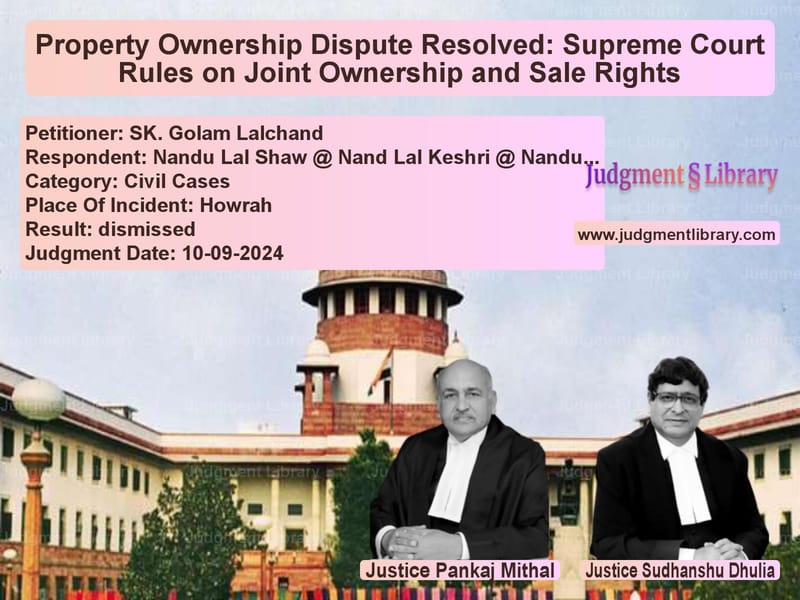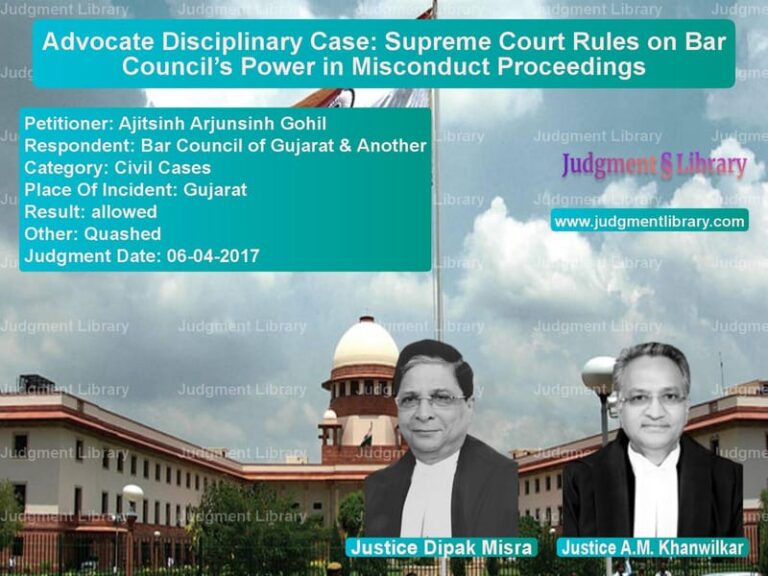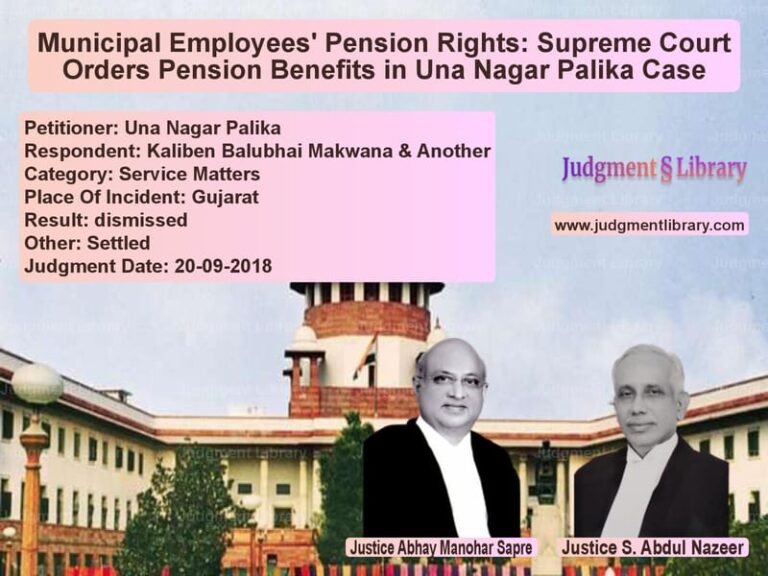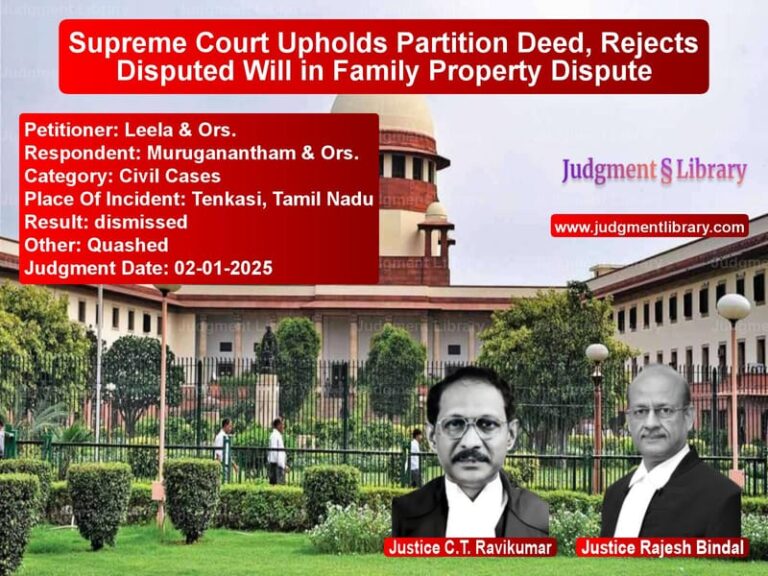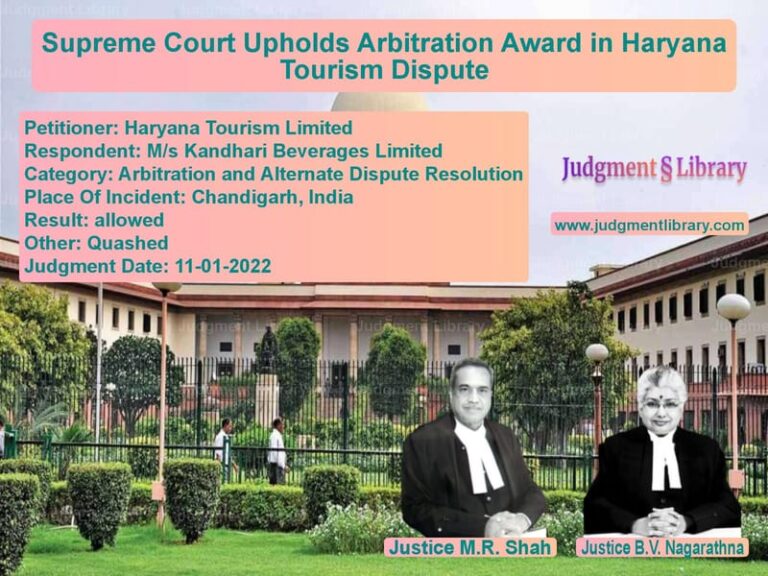Property Ownership Dispute Resolved: Supreme Court Rules on Joint Ownership and Sale Rights
The case before the Supreme Court involved a property ownership dispute between SK. Golam Lalchand (the appellant) and Nandu Lal Shaw @ Nand Lal Keshri @ Nandu Lal Bayes (the respondent). The key issue was whether Brij Mohan, the son of the deceased co-owner Sita Ram, had the legal right to transfer the entire disputed property in favor of SK. Golam Lalchand.
The property in question, measuring approximately 6 Cottahs 1 Chittack and 30 sq. ft., along with 17 rooms, was situated at 100/3 Carry Road, Howrah. It was originally purchased in 1959 by two brothers, Sita Ram and Salik Ram, in equal shares. The dispute arose after Brij Mohan sold the property to the appellant without an official partition between co-owners.
Background of the Case
The respondent, Nandu Lal, claimed that he and his siblings inherited a share of the property from their late father, Salik Ram. He argued that Brij Mohan had no exclusive right to sell the entire property to one of the tenants, SK. Golam Lalchand, because the property was never partitioned.
The lower court dismissed the suit, stating that the respondent had failed to prove his possession. However, the First Appellate Court reversed this decision, ruling that the property had never been legally partitioned. The High Court upheld this ruling, leading to the present appeal before the Supreme Court.
Arguments of the Petitioner (Appellant)
- The appellant, SK. Golam Lalchand, argued that he was a bona fide purchaser who had legally acquired the property through a registered sale deed dated 19.05.2006.
- He contended that Brij Mohan was the absolute owner of the property, as he had inherited it from his father, Sita Ram.
- He further claimed that the three sisters of Brij Mohan had relinquished their rights in the property, making Brij Mohan the sole owner.
Arguments of the Respondent
- The respondent, Nandu Lal, countered that no legal document proved that his father, Salik Ram, had gifted his share to his brother, Sita Ram.
- He argued that without an official partition, Brij Mohan could not have lawfully sold the entire property.
- He maintained that the sale deed executed by Brij Mohan was invalid and sought a permanent injunction against the appellant to prevent forced eviction.
Supreme Court’s Observations and Ruling
The Supreme Court noted that the original deed of purchase from 1959 showed both Salik Ram and Sita Ram as joint owners. There was no evidence to prove that Salik Ram had transferred his share to Sita Ram, and the alleged family settlement was never presented in court.
In a key ruling, the Court stated:
“The gifting and the relinquishment of shares by the three daughters/sisters in favor of Brij Mohan could not be established. The property remained a joint property, and Brij Mohan alone was not competent to execute a sale of the entire property in favor of the appellant.”
The Court affirmed that Brij Mohan could only sell his undivided share, but not the entire property, without the consent of other co-owners. It upheld the judgments of the First Appellate Court and the High Court, ruling that:
Read also: https://judgmentlibrary.com/equitable-mortgage-and-delay-in-justice-supreme-courts-landmark-ruling/
“Since the suit property has many co-owners, the appellant could not have acquired full rights over the entire property solely based on the sale deed dated 19.05.2006.”
Final Judgment
The Supreme Court dismissed the appeal, confirming that Brij Mohan did not have the authority to sell the entire property. The appellant was restrained from claiming ownership of the whole property until a legal partition was conducted.
This judgment underscores the importance of partitioning joint properties before executing sales and reaffirms the legal protections available to co-owners against unauthorized transactions.
Petitioner Name: SK. Golam Lalchand.Respondent Name: Nandu Lal Shaw @ Nand Lal Keshri @ Nandu Lal Bayes.Judgment By: Justice Pankaj Mithal, Justice Sudhanshu Dhulia.Place Of Incident: Howrah.Judgment Date: 10-09-2024.
Don’t miss out on the full details! Download the complete judgment in PDF format below and gain valuable insights instantly!
Download Judgment: sk.-golam-lalchand-vs-nandu-lal-shaw-@-nan-supreme-court-of-india-judgment-dated-10-09-2024.pdf
Directly Download Judgment: Directly download this Judgment
See all petitions in Property Disputes
See all petitions in Specific Performance
See all petitions in Damages and Compensation
See all petitions in Judgment by Pankaj Mithal
See all petitions in Judgment by Sudhanshu Dhulia
See all petitions in dismissed
See all petitions in supreme court of India judgments September 2024
See all petitions in 2024 judgments
See all posts in Civil Cases Category
See all allowed petitions in Civil Cases Category
See all Dismissed petitions in Civil Cases Category
See all partially allowed petitions in Civil Cases Category

